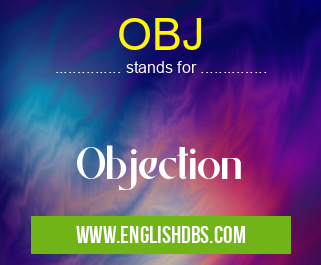What does OBJ mean in LAW & LEGAL
OBJ is an abbreviation for the word Objection. An objection is a legal term used in court proceedings, referring to any dispute raised by one of the parties in a lawsuit. It can be made against evidence, testimony from witnesses, or other arguments presented by either side. This objection can take place both before and during trial and can be regulated by rules set forth by the court system.

OBJ meaning in Law & Legal in Governmental
OBJ mostly used in an acronym Law & Legal in Category Governmental that means Objection
Shorthand: OBJ,
Full Form: Objection
For more information of "Objection", see the section below.
Essential Questions and Answers on Objection in "GOVERNMENTAL»LAW"
What does it mean when someone objects in court?
When someone objects in court, they are voicing their disagreement with something that was said or presented in the courtroom. This could pertain to witness testimony, evidence introduced, legal arguments, or even procedural matters like questioning techniques used by attorneys.
Why do lawyers object during trials?
Lawyers object during trials to challenge evidence or testimony that they think is inaccurate or irrelevant to the case at hand. Objections also allow lawyers to create delays in proceedings should they need extra time to prepare for certain testimonies or reevaluate their approaches.
What type of objections can be raised during trial?
The types of objections that can be raised during trial depend on the rules established by each jurisdiction's court system. Common objections include hearsay (statements made outside of court), non-compliance with legal standards for producing evidence, lack of foundation for introducing certain facts into evidence, relevance (unrelated information) and prejudice (offending a jury). Additionally, prosecutors may raise constitutional objections as well.
Are there limits on when objections may be made?
Yes, there are generally limits imposed on when objections may be made depending on the jurisdiction's rules of procedure regarding its court cases. For example, most states require an objection to be timely—made shortly after an issue arises—in order for it to hold up within a particular case. Additionally some issues cannot retroactively challenged via objection following their occurrence.
Can an attorney withdraw an objection once it has been made?
Generally speaking yes; attorneys have the right to withdraw their own objections as well as request judges overrule certain ones that have already been issued if needed.. In either instance a lawyer must provide sound reasoning behind his/her withdrawal so that other parties involved know why it is being done and how it affects matters at hand.
Final Words:
Ultimately OBJ refers to Objection which is something lawyers use often within litigation proceedings as a means of challenging various aspects related to their case such as relevant facts or testimonies from witnesses amongst other things. Understanding this term and its implications can help parties involved navigate through the process more effectively while ensuring fairness throughout these proceedings.
